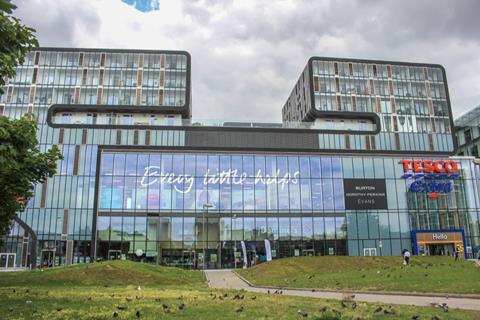Executive chairman says contractors ‘remain fully in firing line for work now deemed non-compliant’
Willmott Dixon has said the cost of having to carry out cladding remediation work on a residential scheme has gone up again.
In its report and accounts, now filed at Companies House, the firm said the amount it was having to shell out to fix the job went up by £3.9m.
It said the figure was for completing the works and legal fees for third party recoveries. Although the job is not named, the amount is believed to be related to its dispute on a £250m scheme in south-east London called Woolwich Central.

In its 2023 accounts, the firm said the total cost associated with the work, which included legal fees, was £48.1m meaning the latest estimate has pushed the bill up to £52m.
The firm began action in 2023 against five companies it claims are responsible for defects with the external wall system on the Woolwich Central scheme which is owned by Tesco.
Willmott Dixon had already put firms on notice a year earlier, saying that it would go after those it said were avoiding responsibility for footing the bill on cladding repair work, in a sign of the wider implications for the industry over the issue of who pays for these kind of repairs following the Grenfell Tower fire eight years ago.
In its 2022 accounts, executive chairman Rick Willmott pointed the finger at firms in several sectors, including designers, fire engineers and insurers, who, he said, “so far have not faced up to their responsibilities or obligations” regarding the cost of recladding work that is now required in order to comply with building safety legislation.
Willmott Dixon has already said that it recovered more than £20m for cladding remediation work last year and has previously said its bill to fix legacy cladding issues across several schemes was £62m.
In its latest accounts, Willmott Dixon said “a significant proportion of the work” at Woolwich Central has been completed and added that it was setting aside a further £10m “in relation to an obligation to complete extensive remedial works on an additional residential development completed in 2012”.
But Willmott Dixon said it was confident it would recoup the money it was having to spend on repairs. “Significant recoveries in relation to the exceptional cost provision are anticipated in future years from supply chain partners and professional indemnity insurance policies. These material amounts are anticipated to be recognised as profit as the recoveries become virtually certain.”
In a note accompanying the 2024 accounts, Rick Willmott said contractors “remain fully in the firing line for remediating any [high-risk buildings] they built containing cladding, insulation and fire barriers that were previously fully approved by Local Authority Building Control but are now deemed non-compliant”.
He added: “With opacity and ambiguity in regulations the industry has naturally become highly reticent of taking risk where retrospective reinterpretation (an unwelcome precedent created by the last government) of regulation or statute could create immense future liabilities.”
And Willmott used his notes to say: “The new Building Safety Regulator is so under resourced that billions of pounds of development is locked in the new ‘gateway’ approval system. Just one of our schemes should have received approval within 13 weeks of submission, we are now over 30 weeks post application with no certainty of when we will progress.”
Turnover last year was flat at £1.2bn but the £20m it recovered meant it returned to a pre-tax profit of £47m from a £14.4m pre-tax loss last time.


























No comments yet